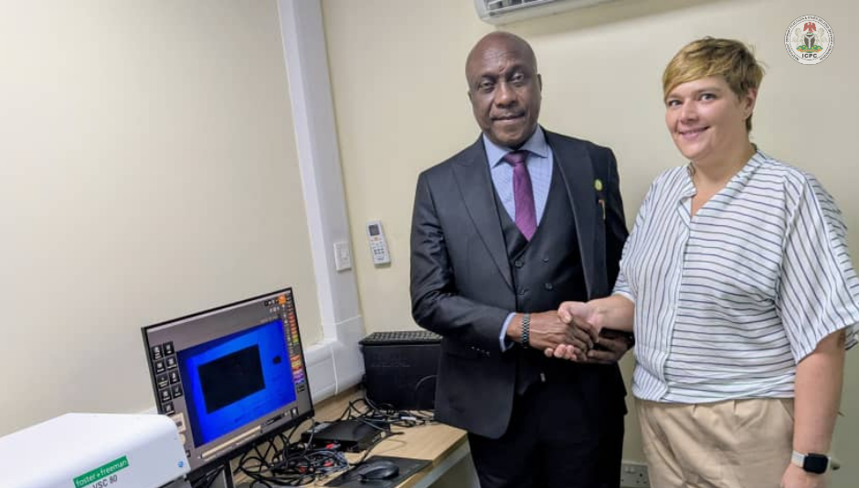
UK Forensic Workstation Donation to Nigeria’s ICPC Sparks Spyware Fears and Public Backlash

A recent donation by the British High Commission to Nigeria’s Independent Corrupt Practices Commission (ICPC) has ignited public controversy and online debate, following accusations that the equipment could compromise national security.
On June 26, the British government handed over a VSC 80/FS forensic document workstation to the ICPC’s Lagos office, a move described by both parties as part of their “ongoing cooperation in advancing investigative capacity and institutional efficiency.” The device was formally received by the Lagos Resident Anti-Corruption Commissioner, Chukwurah Alexander, from Ms. Hannah Chatterton, representing the UK High Commission.
However, the seemingly routine gesture of international support has drawn intense scrutiny, especially after Nigerian investigative journalist and Editor-in-Chief of West Africa Weekly, David Hundeyin publicly raised red flags about the true intentions behind the donation.
In a strongly worded post on X, Hundeyin warned that the system may be loaded with “multiple malware and spyware programmes” and embedded hardware backdoors, capable of covertly compromising sensitive national data. According to him, the ICPC would be “better off setting it on fire” than risking its deployment in critical investigations.
In addition to the multiple malware and spyware programmes built into the OS, this ‘donation’ will have so many backdoors built into the hardware that the ICPC is genuinely better off setting it on fire than using it,” Hundeyin wrote. “The only halfway productive thing you should do with this computer is donate it to the nearest secondary school so the students can use it to do research, type their assignments, play games and watch football.”
The explosive warning has sparked broader concerns over Nigeria’s increasing dependency on foreign partners for digital infrastructure, particularly in sensitive areas such as forensic analysis and national security.
The controversy arrived just days after former President Olusegun Obasanjo issued a scathing rebuke of African governments’ over-reliance on external powers, stating that such dependency weakens institutional development and compromises sovereignty.
The ICPC has not yet issued an official statement in response to the allegations. When contacted by West Africa Weekly, the Commission declined to confirm whether the donated forensic device had undergone independent vetting or cybersecurity screening.
As the forensic system remains housed at the ICPC Lagos office, public trust in the agency’s technological autonomy and its ability to resist foreign surveillance is now being tested. Regardless of the intent behind the donation, the perception of vulnerability could undermine the agency’s integrity and weaken its mandate to combat corruption.
Analysts warn that as Nigeria continues to rely on foreign hardware and software for law enforcement and intelligence operations, the risk of unintentional exposure or manipulation of national data grows, especially when transparency and independent auditing mechanisms are absent.
For now, the workstation remains unused as public discourse intensifies over the role of international “aid” in shaping the internal operations of key Nigerian institutions, and whether such aid carries more strings than support.
Read More:
- DR Congo, Rwanda to Sign US-Mediated Peace Deal
- Missing ₦210tn: Nigerian Senate Rejects NNPCL’s Retreat Excuse, Gives 10-Day Ultimatum to Appear Before Probe Panel
About The Author
Mayowa Durosinmi
author
M. Durosinmi is a West Africa Weekly investigative reporter covering Politics, Human Rights, Health, and Security in West Africa and the Sahel Region
Mayowa Durosinmi
M. Durosinmi is a West Africa Weekly investigative reporter covering Politics, Human Rights, Health, and Security in West Africa and the Sahel Region
Related Articles
Asake Sets New Billboard Afrobeats Record as Chart Presence Grows
Asake has further cemented his place as one of Afrobeats’ most dominant...
ByWest Africa WeeklyJanuary 29, 2026Nigerians Lament PayPal’s Return as Old Wounds Resurface
PayPal’s reentry into Nigeria through a partnership with local fintech company Paga...
ByWest Africa WeeklyJanuary 29, 2026Tanzania Eyes Gold Sales as Aid Declines and Infrastructure Needs Grow
Tanzania is weighing plans to sell part of its gold reserves to...
ByWest Africa WeeklyJanuary 29, 2026Mali Tightens Grip on Explosives Supply With New Majority Stake
The Malian government has taken majority ownership of a civil explosives manufacturing...
ByWest Africa WeeklyJanuary 29, 2026












Leave a comment